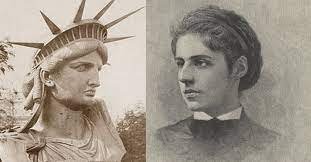“Until we are all free, we are none of us free”
Immigrants, escaping various forms of oppression and extremism, immigrated to a new nation in search of life, liberty, and the pursuit of happiness. America championed these ideals—liberty and tolerance—which mutually support one another in shaping a fair, peaceful, and prosperous society. While liberty guarantees the individual freedoms of people, tolerance establishes a structure for peaceful coexistence with a diversity of thought and practices within a nation. Collectively, they lay the groundwork for a society committed to upholding the principles of individual rights, pluralism, and civic virtue.
Emma Lazarus (1849–1887), an American poet and social activist, is best known for her sonnet "The New Colossus," which is inscribed on a bronze plaque at the base of the Statue of Liberty. Born into a Sephardic Jewish family in New York City and empowered by the Jewish values of social justice, she championed various social impact and literary initiatives. Through her poetry and essays, Lazarus explored themes of identity, culture, and justice from a place of compassion and inclusion. Her intellectual contributions contributed to a broader understanding of the importance of tolerance and the celebration of diversity in American society.
This societal utopia in which the American Dream, notions of independent states as guarantors of liberty, and the legacy of Al-Andalus intertwine, is not merely a dream, but rather a vision, a beacon of hope for a world that embraces diversity as its strength and dialogue as its compass. It is a vision that beckons us to strive for a future in which humanity flourishes, united in its pursuit of knowledge, understanding and shared prosperity.
The values of tolerance and liberty, often believed to be uniquely American, thrive in the MENA region in their own unique forms. Through the unique heritage of the Sephardic-American visionary Emma Lazarus, one can be equipped to see these common bonds.

